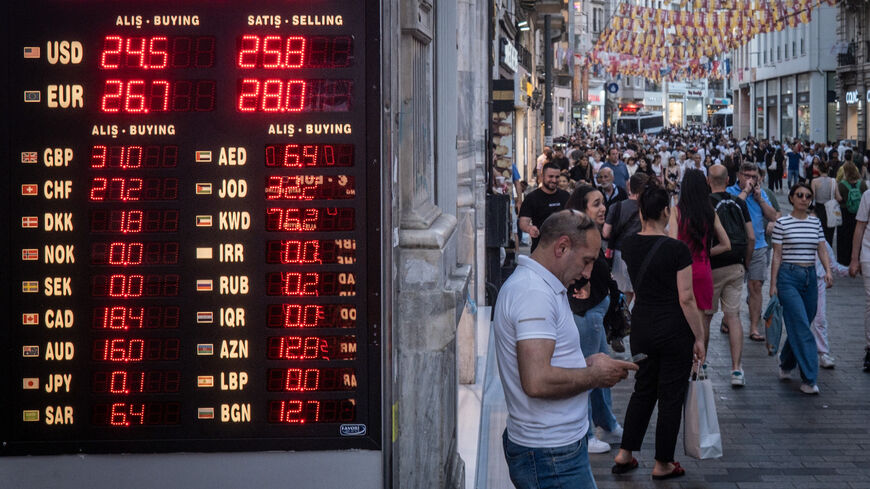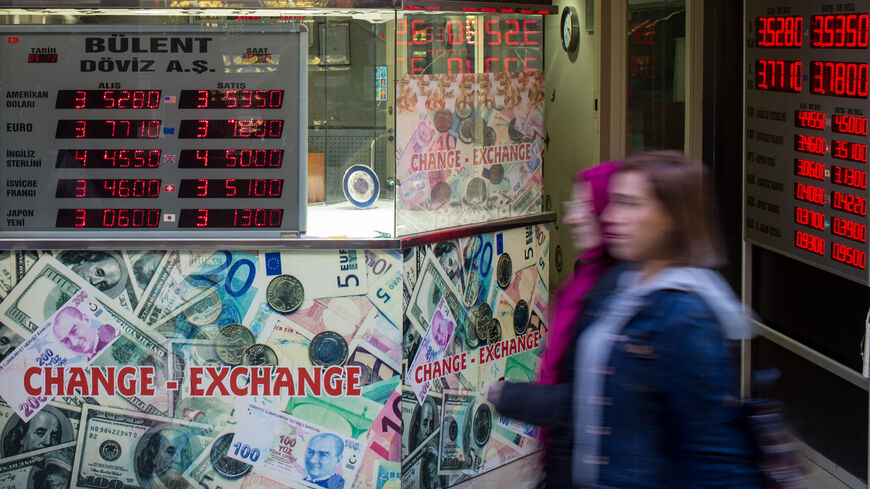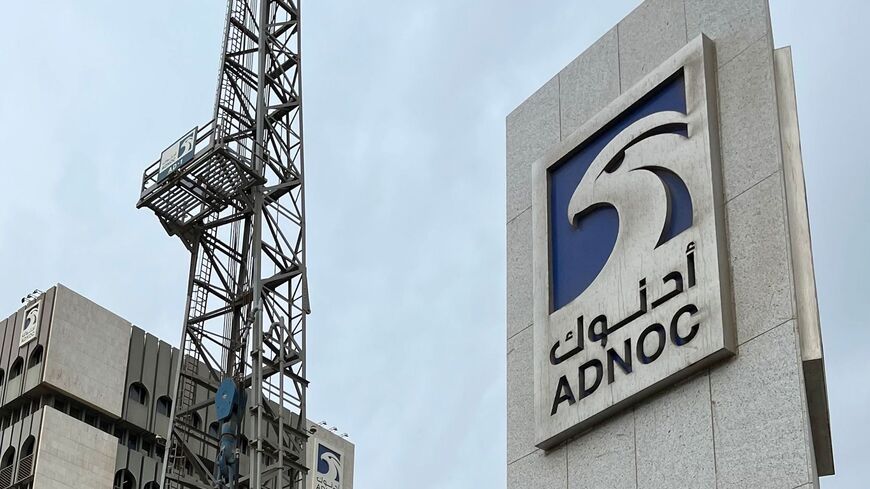Turkish lira outlook: Policy shift indicates progress, but bolder rate hikes needed for investor confidence
Al-Monitor Pro Members
Piero Cingari
Financial analyst
July 3, 2023
The recent rise in interest rates in Turkey could potentially signal a turning point for the Turkish lira, provided that the Central Bank of Turkey (CBT) continues to pursue a strategy of aggressive tightening in the coming months. However, given significant internal and external macroeconomic imbalances, there is little room for policy errors at this critical juncture. Hafize Gaye Erkan, the newly appointed governor of the CBT with prior experience on Wall Street, faces the daunting task of winning back the trust of foreign investors who have fled the country in recent years due to the currency's severe devaluation and unorthodox economic policies.
- On June 22, the CBT increased its key rate by 650 basis points to 15%, the highest level since November 2021. The increase in the benchmark one-week repo rate was the largest since June 2018, when the CBT raised it by 9.75%.
- This was Erkan's first monetary policy meeting as governor of the CBT. Previously, she served as co-CEO and president of US-based First Republic Bank and head of Goldman Sachs' Financial Institutions Group Analytics and Strategies.
- Alongside the appointment at the CBT, President Recep Tayyip Erdogan designated Mehmet Simsek as the new treasury and finance minister. Simsek previously held this position from 2009 to 2015 and played a key role in Turkey's recovery from the 2008 global financial crisis.
- The business and financial sectors interpreted the two appointments at the helm of the CBT and the Ministry of Finance as early signs of a shift toward more conventional and orthodox economic policies.
- In a concise statement accompanying the CBT rate determination, the Monetary Policy Committee (MPC) underlined that in contrast to previous statements, the CBT finally acknowledged that the underlying inflation trend has increased as a result of strong domestic demand, cost pressures and the persistence of services inflation, and that the MPC anticipates "the deterioration in pricing behavior will put further pressure on inflation."
- In May 2023, Turkey’s annual inflation rate fell for the seventh consecutive month to 39.6%, the lowest level since December 2021. On a monthly basis, consumer prices were unchanged in May, the lowest monthly reading since 2008.
- The rate of inflation slowed for housing and utilities (20.7% versus 43.2%), alcoholic beverages and tobacco (30.1% versus 38.2%), and transportation (23.7% versus 25.2%). In contrast, inflation accelerated for service-related items such as health (66.9% versus 66.6%), education (50.9% versus 44.1%), and hotels, cafes and restaurants (69.0% versus 66.4%). In addition, the core inflation rate increased to 46.6% in May from 45.6% in April.
- The CBT will likely have to revise its inflation projections — presently 22% for the end of 2023 — higher in the coming months. The impending inflation report, scheduled for release on July 27, will provide investors with additional insight into the CBT's forecast trajectory and policy intentions.
- In 2023, Turkey’s current account deficit deteriorated further, according to CBT data. In the first four months of the year, Turkey accumulated a deficit of $29.7 billion, a nearly 50% increase from the deficit of $20.3 billion in the first four months of 2022. The most recent data for April 2023 indicated a deficit of $2.54 billion that was more than double that of April 2022.
- At the end of April 2023, the CBT reported that the stock of short-term external debt ballooned to $161.9 billion, representing an increase of 8.6% compared to the end of 2022. During this period, the stock of short-term external debt held by banks increased by 6.6% to $66.4 billion. Interest and principal payments on the central government's external debt are projected to total $12.5 billion between June 2023 and May 2024.
- Domestically, there is still a substantial gap between the CBT's one-week repo rate and the deposit interest rates paid on Turkish lira bank accounts, which currently stand at 41%. This creates distortions in the financial system, which hurt domestic banks. A realignment between interest rates is crucial to improve Turkey’s macroeconomic stability.
- Despite the recent uptick in foreign exchange reserves, which have recently risen by $7.4 billion, mainly due to higher tourism inflows, the country's wide external and internal imbalances pose challenges to the CBT's gradual tightening policy.
- Turkey's policymakers must regain the confidence of foreign investors, which has been eroded by years of unconventional monetary policies, in order to address the strain on the current account side, refinance maturing public and private external debt, and bolster the still fragile state of foreign reserves.
- The Turkish lira has shed nearly a third of its value against the dollar since the start of the year. Relying on currency depreciation to cure balance of payments challenges was not a successful strategy in the past, nor is it likely to be effective today.
Scenario 1: The central bank seeks a gradual tightening, and the Turkish lira continues depreciating, albeit at a slower pace
The CBT opts for a gradual tightening of monetary policy while crossing its fingers that external inflationary shocks do not materialize. In this case, the CBT is likely to accept some additional depreciation of the Turkish lira in order to improve current account imbalances.
A weaker Turkish lira can temporarily boost tourism seasonal inflows, but tackling the inflation problem would be further postponed.
A rate increase of less than 400 basis points at the July 20 meeting would indicate modest tightening by the CBT. This is unlikely to restore international investors' trust in the near term.
In this scenario, we would anticipate a further 5% devaluation of the Turkish lira over the course of the summer, with the US dollar trading at between 26 and 27 Turkish lira.
Scenario 2: The central bank hikes interest rates to over 20% in July, and the Turkish lira devaluation could be halted and reversed
In this scenario, the CBT opts for more aggressive tightening, revises its inflation estimates to reflect real-world dynamics, and signals a firm commitment to tackle inflation going forward.
Any interest rate hike in July that exceeds 500 basis points, bringing the policy rate to more than 20% with commitments to increase further, would likely be viewed by the market as a departure from earlier unorthodox policies and would likely benefit the Turkish lira.
The Turkish lira to US dollar exchange rate is likely to retrace its advance following the CBT's decision on June 22, settling near 23.5 lira to the dollar in the short term. If inflation data continues to trend in the right way and the CBT raises rates aggressively, the exchange rate may retrace to 20 levels, a 20% drop from current levels.
When CBT governor Murat Cetinkaya raised interest rates by 625 basis points to 24% in September 2018 and left them there until July 2019, the lira strengthened by 15% against the dollar over the next six months.
In such a situation, high-yield bond investors may return to the sovereign bond market in foreign currency and local currency to profit from the CBT policy move, supporting the lira.
Markets may corner the CBT, causing it to rise sharply in July. As the July 20 CBT meeting approaches, the market will likely keep the Turkish lira under pressure, pushing it to a range of 26.5 to 27.50 liras per dollar.
This trend of currency depreciation will put the incoming governor, Erkan, in a difficult position, potentially resulting in a schism between the new monetary policy course and the government.
Due to the precarious state of the Turkey's balance of payments, the government cannot afford the luxury to move forward without foreign investors. However, bold actions in terms of monetary policy must be taken to regain their confidence.
I expect the CBT to raise rates aggressively in July, effectively breaking the vicious circle of currency depreciation driving inflation and reclaiming some much-needed policy independence.
Piero Cingari is a financial analyst and writer who has worked as a fixed-income, FX and commodities analyst in the asset management and brokerage industry. Throughout his career, he has covered and analyzed economic and financial developments in Turkey, Egypt, and the Gulf countries. Piero is particularly interested in how major macroeconomic trends influence financial markets and how global geopolitical events may affect the economy of the MENA region.
We're glad you're interested in this memo.
Memos are one of several features available only to PRO Expert members. Become a member to read the full memos and get access to all exclusive PRO content.

Already a Member? Sign in
The Middle East's Best Newsletters
Join over 50,000 readers who access our journalists dedicated newsletters, covering the top political, security, business and tech issues across the region each week.
Delivered straight to your inbox.
Free
What's included:
Free newsletters available:
- The Takeaway & Week in Review
- Middle East Minute (AM)
- Daily Briefing (PM)
- Business & Tech Briefing
- Security Briefing
- Gulf Briefing
- Israel Briefing
- Palestine Briefing
- Turkey Briefing
- Iraq Briefing
Premium Membership
Join the Middle East's most notable experts for premium memos, trend reports, live video Q&A, and intimate in-person events, each detailing exclusive insights on business and geopolitical trends shaping the region.
$25.00 / month
billed annually
$31.00 / month
billed monthly
What's included:
Memos - premium analytical writing: actionable insights on markets and geopolitics.
Live Video Q&A - Hear from our top journalists and regional experts.
Special Events - Intimate in-person events with business & political VIPs.
Trend Reports - Deep dive analysis on market updates.
We also offer team plans. Please send an email to pro.support@al-monitor.com and we'll onboard your team.
Already a Member? Sign in






